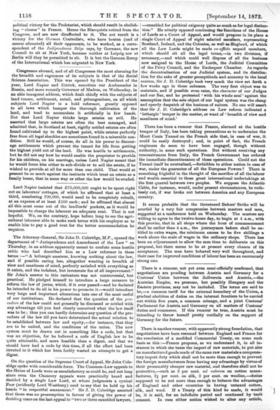On the question of the Supreme Court of Appeal, Sir
John Cole- ridge spoke with considerable force. The Common-Law appeals to the House of Lords were as unsatisfactory as could be, and not long since even the Chancery appeals were practically heard and decided by a single Law Lord, at whose judgments a cynical Pear (evidently Lord Westbury) used to say that he held up his hands "in respectful amazement." Sir J. 1). Coleridge asserted that there was no presumption in favour of giving the power of deciding cases on the last appeal to "two or three ennobled lawyers, —ennobled for political exigency quite as much as for legal distinc- tion." He utterly opposed continuing the functions of the House of Lords as a Court of Appeal, and would propose in its place a single Court of Appeal of eight salaried members, representing Scotland, Ireland, and the Colonies, as well as England, of which all the Law Lords might be made ex-officio unpaid members, which should sit all the legal terms,—in two divisions, if necessary,—and which could well dispose of all the business now assigned to the House of Lords, the Judicial Committee of the Privy Council, and the Exchequer Chamber. As regards the decentralisation of our Judicial system, and its distribu- tion for the sake of greater promptitude and economy in the local 'centres, Sir J. D. Coleridge took very much the view set forth a few weeks ago in these columns. The very first object was to I maintain, and if possible even raise, the character of our Judges and our Bar, and he protested with his whole soul' against the assumption that the sole object of our legal system was the cheap and speedy despatch of the business of suitors. No one will assert that Sir J. D. Coleridge's address on Law reform indicated a 'lethargic' temper in the matter, or want of breadth of view and manliness of mind.'


































 Previous page
Previous page